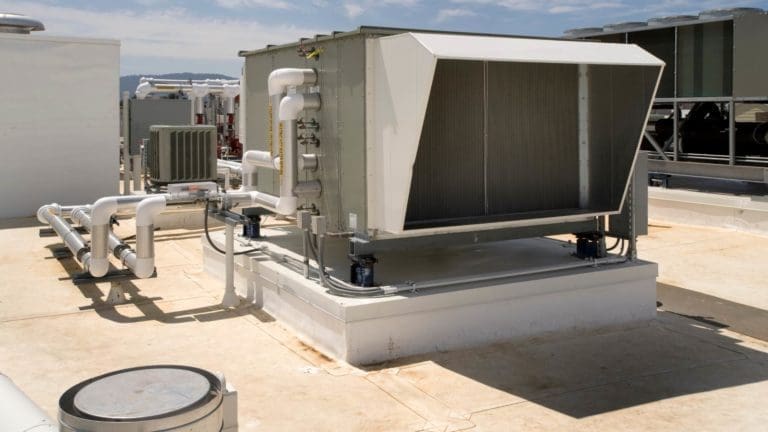There’s never a good time for an industrial HVAC system to fail.
Luckily, not every symptom or odd behavior indicates that your HVAC is on the brink of failure. There are many cases where you’ll just need to do some quick maintenance. Sometimes, it may take seconds. Say, when you need to wipe down some exterior equipment or an indoor temperature sensor.
Like any mechanical system, though, an industrial HVAC system can fail. Regular maintenance will keep it up and running longer, but it is limited by the life of its individual parts. The most important of these is the industrial compressor, which has a service life of around eight to ten years.
The compressor does the mechanical work that makes the refrigerant gas available to the system as a whole. Whether you are cooling or heating a space, the system effectively reuses the same refrigerant gas many times over because of the compressor’s ability to pressurize it.
A modern compressor is highly reliable and rarely fails out of the blue. When it does go down, however, the consequences can be dire. Depending on whether you have a plan to replace your compressor, this can range from an inconvenience to a serious disaster.
That being the case, you should follow up with any unusual HVAC symptoms and get to the root cause. It is usually easy to rule out the compressor, and if the compressor is the source, you have the opportunity to take the right steps before it is too late to salvage your HVAC system.
Let’s take a closer look at common signs your HVAC may be failing:
1. Unusual Noises From Industrial HVAC
Unusual noises can come in many forms, but a clicking sound is the most common. Clicking noises can mean that components are loose, including internal fasteners. Motor mounts may be worn out, which accelerates wear and tear while the system is in operation. Compressor failure often follows.
2. Industrial HVAC Has Vibration During Startup
Vibration often goes hand in hand with unusual noises. The system is no longer steady and more of the interior parts are free to move back and forth. Without a fix, it is only a matter of time before something crucial becomes completely loose and disconnected.
3. Warm or Lukewarm Air From Industrial HVAC
Warm air during an HVAC’s cold cycle can be caused by many issues, not all of them serious. Refrigerant levels should be your go-to. If the refrigerant is used up faster than expected, you may have a leak. Even so, warm air can also indicate that the compressor is no longer able to cycle sufficient refrigerant.
4. Reduced Airflow From Industrial HVAC
Reduced airflow is another potential red herring. This problem can be as simple as needing to clean or replace an air filter. In rarer cases, though, the compressor itself is involved. When the filter is in good condition and there are no other blockages, reduced airflow can mean compressor loss is imminent.
5. Industrial HVAC has Difficulty During Startup
When a compressor is struggling to start, any individual startup could be its last. Yes, at times you can get it going again by adjusting the thermostat. Still, it’s critical to think about the best way to replace an industrial compressor that isn’t starting up properly, as field repair is often not possible.
6. Tripped Circuit Breakers
A tripped circuit breaker is an early warning for one of the most serious issues you can have with your compressor – and sometimes, even your entire building. Don’t simply flip the breaker and get back to work. Wiring or voltage issues could be pushing your compressor toward failure in days or even hours.
7. Continuous Operation
Continuous operation of an HVAC system is always a bad sign, whether it’s an industrial or commercial system. It may be time to calibrate your thermostat and make sure your sensors are working. If these issues don’t pan out, the compressor may have lost its ability to pressurize properly.
8. Moisture or Puddles
Where there’s a puddle, there’s a leak – and if you see one, it’s always possible that there are more out there. When refrigerant levels are critically low, the compressor can overheat in a matter of minutes. A leak can also be hazardous to human health, so be sure to take action as soon as you can.
When HVAC Troubles Mount, It’s Time for a Remanufactured Industrial Compressor
Luckily, most problems with your HVAC don’t involve the compressor. But when you notice you’re doing more maintenance and repairs that concern the compressor, it’s time to take a look at a replacement.
A remanufactured industrial compressor saves you time and money by using your existing compressor core as the basis of totally re-engineered equipment. It’s always best to retrieve the core before complete failure takes hold. A compressor remanufacturing team can walk you through the process.












